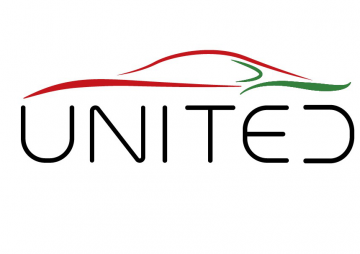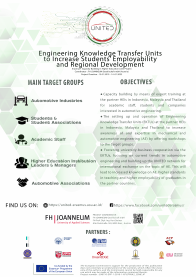UNITED

- UNITED Facebook site: https://www.facebook.com/unitederasmus/
- Website: https://united-erasmus.usu.ac.id
- Video: https://www.youtube.com/watch?v=1FfAOk0jk50
- Storyboard: United Storyboard
 (3.37 MB)
(3.37 MB)
Introduction
The development of automotive and mechanical engineering is fast & checkless. Up-to-date knowledge & infrastructure are key to be successful for companies. (EY Global Automotive & Transportation, 2015) Additionally the population growth (> 9bil in 2050) goes in hand with demands for transportation and mobility - global car production is set to rise by 22,3 mil unites until 2021. The role of engineers is critical in fulfilling this demand at various scales, mostly in the developing world. (UN, 2015)
The UNITED partner countries Indonesia (ID), Malaysia (MY) and Thailand (TH) represent the largest automotive industries (considering the rise in number of units produced) in the SEA region and are highly important for the global car production, but little is done for technical advancement (R&D). Considering the outlook and current facts, more engineers are needed.
Consequently, most OEMs with subsidiaries in ID, MY and TH receive expatriates from overseas to fill knowledge gaps, which is just another evidence for the existing lack in local human capacities. All partners from ID, MY and TH face a challenge which inhibits them from further growing in the automotive industry: the lack of highly educated engineers focusing on automotive development.
The UNITED project aims to improve the current situation at the participating higher education institutions and the regional industries that are connected.
Main Objectives of the UNITED Project
UNITED will close the current lack of skilled labor on automotive engineering (AE) to increase the positive impact of the automotive industry on regional development through
- capacity building of experts by the execution of expert trainings for academic staff, students and companies interested in AE
- the installation and operation of engineering knowledge transfer units (EKTUs) at the SEA higher education institutions (HEIs) to increase awareness and expertise of automotive and mechanical engineering
- fostering university-business cooperation via the installation of the EKTUs and the UNITED network, which will lead to increased knowledge on AE, higher standards in teaching and will also create higher employability of graduates
Academic staff, students and companies will receive upgraded knowledge on automotive and mechanical engineering to reach the following aims:
- to spread the knowledge of automotive and mechanical engineering during vocational trainings of the EKTUs
- to increase the number of projects on automotive and mechanical engineering with companies
- to increase university-business cooperation and the employability of students due to upgraded knowledge on automotive and mechanical engineering
- to create a nationwide and international network with target groups from the automotive industry to increase the economic impact on the regional development in this industry
Main Target Groups of the UNITED Project
The main target groups within the UNITED project are as follows:
- HEIs leaders and managers of the areas of automotive and mechanical engineering
- Academic staff focusing on automotive and mechanical engineering
- Students (and student associations) studying automotive or mechanical degree programs who aim to improve the automotive industry in the participating countries
- Companies operating in the automotive industry
- Automotive associations and political partners
Main Outputs of the UNITED Project
The UNITED engineering knowledge transfer units (EKTUs) at each SEA HEI: The EKTUs ensure that the created training materials will be thoughtfully transferred in form of knowledge to participating countries. For the consortium it is of utmost importance to create a sustainable impact as in terms of technical knowledge, as well as understanding and possibility of hands-on trainings in the field of automotive and mechanical engineering.
UNITED network and knowledge transfer platform: Establishing a network which aims for international exchange on the topics of automotive and mechanical engineering among different target groups and international experts from academia and economy. Attached to the network also a knowledge transfer platform will be established aiming at sharing knowledge among the members of the network on the project´s core topics and to spread the existence of engineering knowledge transfer units as expertise hubs.
Partner Institutions
- FH JOANNEUM Gesellschaft mbH (Austria) – coordinator
- Politecnico di Torino (Italy)
- Aachen University of Applied Sciences (Germany)
- Universitas Sumatera Utara (Indonesia)
- Udayana University (Indonesia)
- Universiti Putra Malaysia (Malaysia)
- Universiti Teknikal Malaysia Melaka (Malaysia)
- Mahasarakham University (Thailand)
- Chulalongkorn University (Thailand)
- DreamEDGE Sdn. Bhd. (Malaysia)
- Atipong Motor Co. Ltd (Thailand)
"The European Commission support for the production of this publication does not constitute an endorsement of the contents which reflects the views only of the authors, and the Commission cannot be held responsible for any use which may be made of the information contained therein." Project number: 598710-EPP-1-2018-1-AT-EPPKA2-CBHE-JP

|

|

